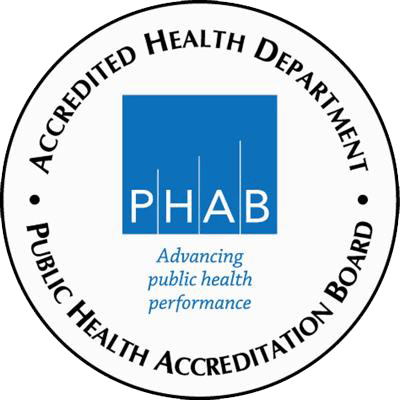Respiratory illness can cause mild to severe illness in people. These illnesses spread through airborne droplets when an infected person coughs, sneezes, or talks.
Anyone can get a respiratory illness, but some people have a higher risk of getting very sick from them. Certain respiratory viruses, like the ones that cause Coronavirus disease 2019 (COVID-19), influenza (flu), and respiratory syncytial virus (RSV) are more likely than others to make people very sick. People may experience severe complications from respiratory illness like pneumonia, hospitalization, or death.
Symptoms
Respiratory viruses may impact nose, throat, lungs, and vocal chords. Symptoms include fever, chills, fatigue, cough, runny or stuffy nose, sore throat, vomiting, headache, and body aches.
Symptoms to Watch For for Flu and COVID-19:
- COVID-19: Fever, cough, shortness of breath, loss of taste or smell, fatigue, and body aches.
- Flu: Fever, chills, muscle aches, sore throat, and fatigue.
Testing is often necessary to confirm which illness you have, as early treatment can make a difference for both flu and COVID-19.
Prevention
Take steps to help protect you and your family form respiratory viruses.
- Get Vaccinated: Flu, RSV, and COVID-19 vaccines are recommended to prevent against severe respiratory illness. See Vaccines section below for more details.
- Washing Your Hands & Improve Air Flow: Frequent handwashing, covering coughs and sneezes, and improving airflow in places where people live and work can lower risk from respiratory viruses.
- Stay Home if Sick: Limit contact with others if you have symptoms to reduce transmission. Stay home and away from others for at least 24 hours after both your symptoms are getting better and you have not had a fever. When resuming normal activities use Everyday Actions for an additional 5 days.
- Take Everyday Actions: Additional layers of protection like masking and physically distancing can lower risk from respiratory viruses.
Vaccines
The recommendations below are for the 2025-2026 respiratory illness season:
Flu (Influenza)
Flu vaccine is recommended for:
- Everyone 6 months and older.
COVID-19
COVID-19 vaccine is recommended for:
- All adults 18 and older.
- All children 6 months to 23 months.
- Children 2 years through 17 years:
- Who have at least one underlying risk factor, who have weakened immune systems, who have never been previously vaccinated for COVID-19, who live in congregate settings, or live in households with those at risk for severe COVID-19.
- Without underlying risk factors whose parents/guardians want them to get a COVID-19 vaccine.
- All pregnant people and those who are planning pregnancy, are postpartum (after pregnancy), or during lactation.
RSV
RSV immunization is recommended for:
- All pregnant people during week 32 through 36 of pregnancy
- All infants under the age of 8 months without maternal RSV vaccine protection entering their first RSV season.
- Children ages 8 months through 19 months who are at increased risk for severe RSV disease.
- Adults ages 50 years through 74 years at increased risk of severe RSV disease.
- All adults ages 75 years and older.
For a copy of your VACCINATION RECORD, visit Vax Verify or call 833-621-1284.
Why Are Vaccines Important
Both COVID-19 and flu vaccines are critical tools in preventing severe illness and reducing the spread of these viruses. Here’s why:
- Protection for Yourself: Vaccination helps your immune system recognize and fight the virus effectively, reducing the likelihood of severe symptoms.
- Community Protection: Vaccines help limit virus transmission, protecting those who are more vulnerable, such as older adults, pregnant women, young children, and individuals with weakened immune systems.
- Prevention of Long-Term Health Issues: In addition to preventing immediate illness, vaccines reduce the risk of long-term complications, such as Long COVID or persistent respiratory issues from the flu.
The Flu and COVID-19 vaccine are updated annually to match circulating strains/variants. You can get the updated COVID-19 and Flu vaccine at the same visit.
Why Get A COVID-19 Vaccine?
- Vaccination remains the best protection against COVID-19-related hospitalization and death
- Vaccination also reduces your chance of suffering the effects of Long COVID
- The virus that causes COVID-19 is always changing
What Are The Benefits and Risk?
Treatment
Treatment can help lower risk of severe illness from respiratory viruses. Antiviral medication is available for both COVID-19 and flu. These medications works best when taken as soon as possible and are recommended for those at higher risk.
If you suspect you have contracted either illness, contact your healthcare provider for guidance on treatment options.
Know if you are at higher risk for severe illness:
- Those at increased risk of serious flu complications include pregnant people, people with asthma and chronic lung disease, diabetes (including gestational diabetes), or heart disease.
- Those at increased risk of serious illness from COVID-19 inlcude:
-
-
- Those 50 years of age and older, especially 65 and older
- Those with certain underlying medical conditions, such as a weakened immune system, heart disease, obesity, diabetes, or chronic lung disease, regardless of your age
-
-
Data & Surveillance
WCHD monitors for respiratory illnesses in coordination with the healthcare systems and providers.
During Influenza season (October 1- May) WCDH, issues a weekly influenze report monitoring the data on flu. Click here to go view the reports.
The Illinois Department of Public Health monitors for seasonal respiratory illness. Go to the IDPH Seasonal Respiratory Illness Dashboard here.

